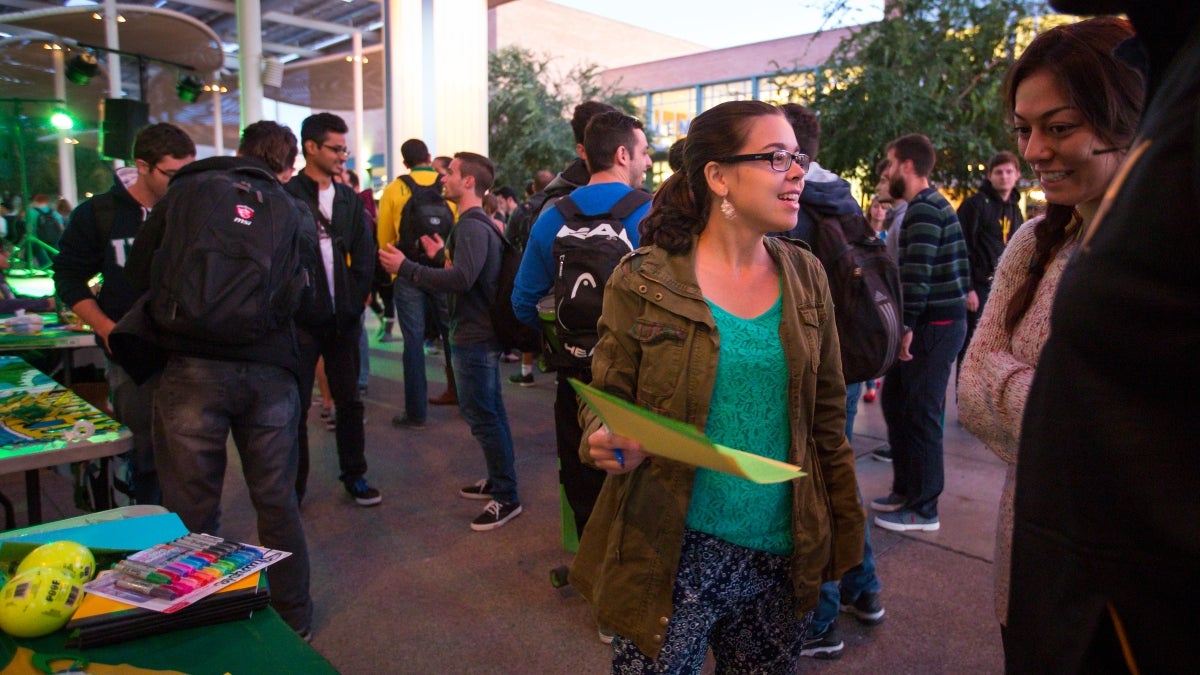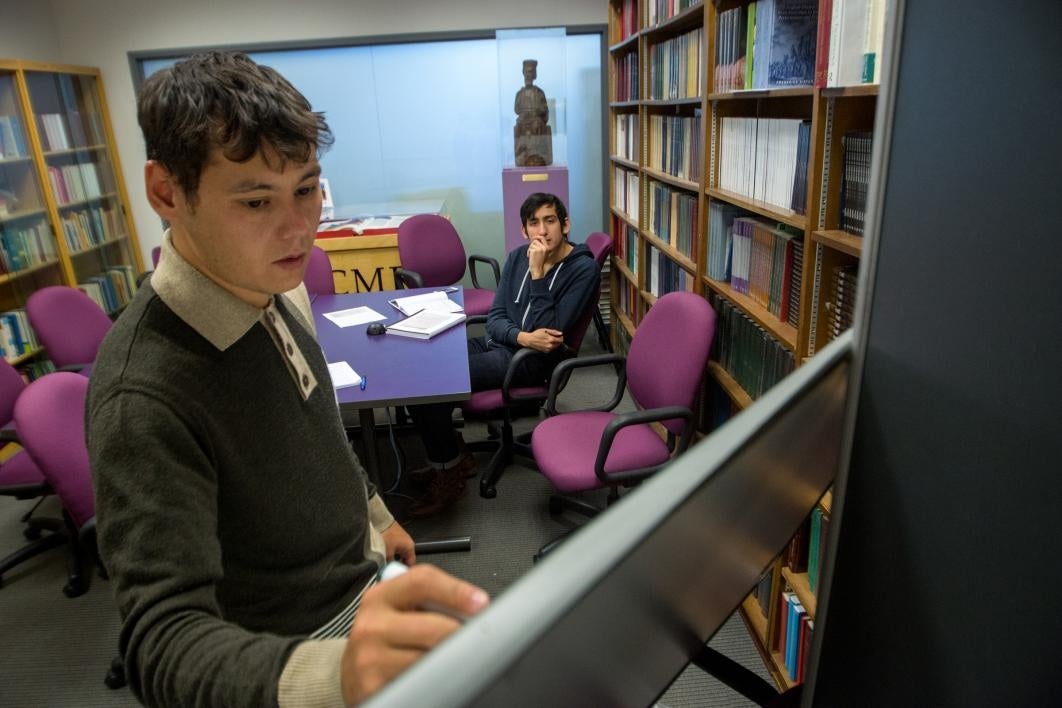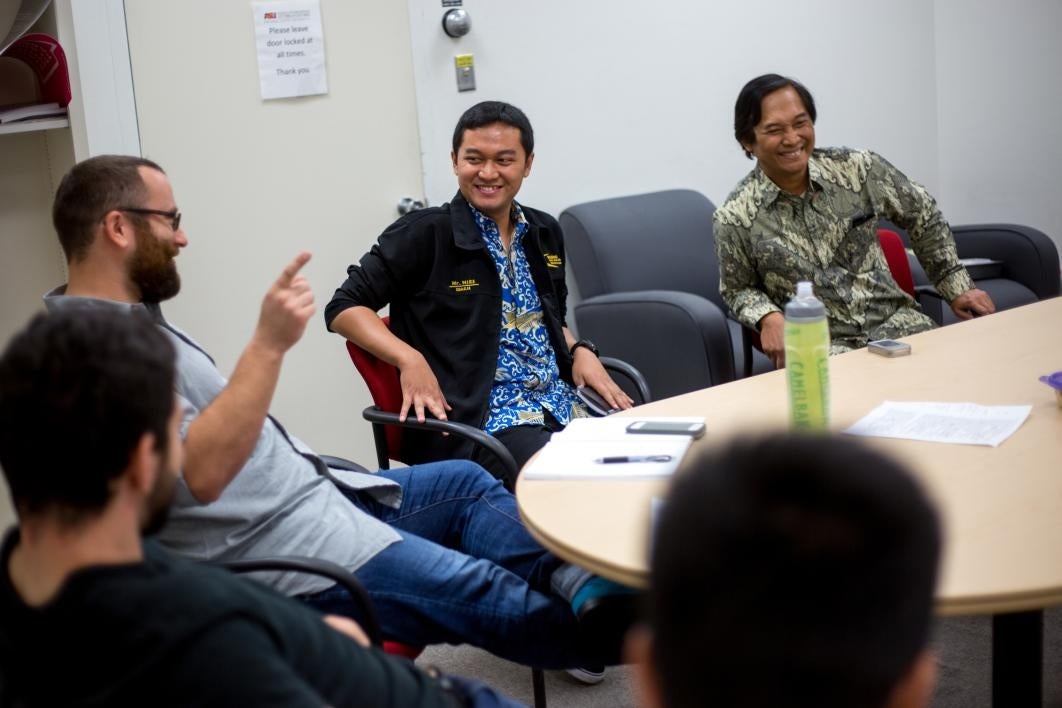It took patience and practice, but Azamat Mamadaliev was able to master the skateboard as a mode of transportation in about a week. Now he uses one every day to get to Arizona State University’s Tempe campus, where he teaches his native Uzbek as a Fulbright foreign language teaching assistant.
Administered by the Institute of International Education, the Fulbright Foreign Language Teaching Assistant (FLTA) Program allows for young educators from around the world to spend a year in America teaching their native language at colleges and universities across the country to help internationalize post-secondary education in the U.S. — a key goal of many institutions as they prepare students for the 21st-century workforce and globalized world.
Four FLTAs from four different countries were chosen to teach their respective languages at ASU for the 2015-2016 academic year. Besides Mamadaliev, they are: Valeria Caldas (pictured above, second from right) from Brazil, teaching Portuguese; Berrin Karasaç from Turkey, teaching Turkish; and Wilman Septiana from Indonesia, teaching Indonesian.
With the exception of Caldas, this is the first time any of them have been stateside. After the initial culture shock wore off — both Karasaç and Mamadaliev admit it took a while to adjust to American food and beverages — they began to settle in quite nicely.
“There are so many nice landscapes to see around Arizona,” Karasaç said. “You have the desert and the heat, but if you go to Flagstaff it’s cold. I’ve been to the Grand Canyon, Sedona, Sunset Crater, Tucson, Antelope Canyon. ... It’s all really beautiful.”
Each FLTA at ASU is paired with a faculty mentor from the Critical Languages Institute or the School of International Letters and Cultures (SILC) to ensure their success.
Overseeing Mamadaliev and Karasaç is Kathleen Evans-Romaine, director of the Critical Languages InstituteThe Critical Languages Institute is a project of the Melikian Center, an instructional and research unit of the College of Liberal Arts and Sciences.. SILC professors Peter Suwarno and David William Foster are overseeing Septiana and Caldas, respectively.
“[Kathleen] is always willing to help me. She answers all of my questions and supports me when I need it,” Mamadaliev said.
As for the FLTAs themselves, their students have nothing but good things to report.
“She’s really sweet, and she has an awesome way of giving us lessons about Brazilian cultures and also learning grammar,” business sophomore Adnan Aljifry said of Caldas.
Zachary Bundy, an architectural studies undergrad, signed up for Uzbek on a whim. He was wooed by the prospect of traveling to the region for graduate research and witnessing its striking Islamic architecture firsthand.
“I have to be able to speak the language to get permission to look at those sites and talk about their preservation,” he said.
Indonesian student Donald Santoso is majoring in law but wanted to study the language because he grew up in the country and plans to move back one day. He appreciates the conversation-based nature of Septiana’s class, saying it allows for more organic discussions and encourages student inquiry.
Even if students aren’t planning on moving to foreign countries in the future, though, Septiana points out that being multilingual is practically a must in today’s society.
“We now live in a globalized world, so we need language to cope with that. It’s the key to understanding,” he said.
On more than one level.
“[Language learning] is very important for job opportunities,” Caldas said, “but also, if not for that, for personal growth. Because when we learn language, we are also learning culture. And I think that’s extremely important.”
More Local, national and global affairs

Arizona PBS is now free to stream for Prime Video viewers in the US
Arizona PBS is now available for streaming on Amazon Prime Video. A new partnership between PBS and Amazon brings the station’s primary, high-definition broadcast channel, along with the 24/7 PBS…

First-ever Taiwan Symposium at Thunderbird celebrates business, cultural connections
The investment by TSMC and other Taiwanese corporations in Arizona will reap dividends not only in thousands of new jobs but also in strengthened cultural connections and new methods of…

Study shows that trust drives successful market economies — but not in the way you may think
From fueling our cars to fulfilling daily coffee habits, the average U.S. cardholder makes 251 credit card transactions per year, according to Capital One.Each of these transactions are built…






